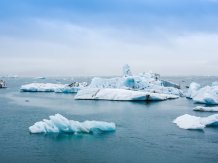articles

The report calls for urgently reducing greenhouse gas emissions to limit the scale of ocean and cryosphere changes
Exeter climate expert plays pivotal role in stark IPCC report
A world-leading climate scientist from the University of Exeter has played a pivotal role in the latest Special Report from the Intergovernmental Panel on Climate Change (IPCC)
Professor Mat Collins, from Exeter’s mathematics department, was lead author on a chapter in the high-profile report, released today, which called on prioritizing timely, ambitious and coordinated action to address unprecedented and enduring changes in the ocean and cryosphere.
The report, called on the Ocean and Cryosphere in a Changing Climate and approved by the 195 IPCC member governments, provides new evidence for the benefits of limiting global warming to the lowest possible level – in line with the goal that governments set themselves in the 2015 Paris Agreement.
It calls for urgently reducing greenhouse gas emissions to limit the scale of ocean and cryosphere changes, as well as preserving the ecosystems and the livelihoods that depend on them for survival.
The ocean and the cryosphere – the frozen parts of the planet – play a critical role for life on Earth. A total of 670 million people in high mountain regions and 680 million people in low-lying coastal zones depend directly on these systems. Four million people live permanently in the Arctic region, and small island developing states are home to 65 million people.
Speaking after the report was launched, Professor Collins said: “This report has shown the multiple impacts of climate change on the ocean and cryosphere. The ocean is warming and acidifying, mountain glaciers and ice sheets are melting and, as a consequence, sea-levels are rising and an ever increasing rate. Warming is driving increases in extreme events such as marine heat waves and tropical cyclones.”
Knowledge assessed in the report outlines climate-related risks and challenges that people around the world are exposed to today and that future generations will face. It presents options to adapt to changes that can no longer be avoided, manage related risks and build resilience for a sustainable future.
More than 100 authors from 36 countries assessed the latest scientific literature related to the ocean and cryosphere in a changing climate for the report, referencing about 7,000 scientific publications.
“The open sea, the Arctic, the Antarctic and the high mountains may seem far away to many people,” said Hoesung Lee, Chair of the IPCC. “But we depend on them and are influenced by them directly and indirectly in many ways – for weather and climate, for food and water, for energy, trade, transport, recreation and tourism, for health and wellbeing, for culture and identity.”
“If we reduce emissions sharply, consequences for people and their livelihoods will still be challenging, but potentially more manageable for those who are most vulnerable,” Lee said. “We increase our ability to build resilience and there will be more benefits for sustainable development.”
Date: 25 September 2019